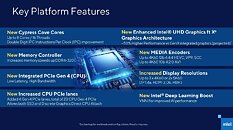Monday, December 21st 2020

Intel 11th Gen Core "Rocket Lake" to See CES 2021 Unveil, Availability Later in Q1
Intel's 11th Generation Core "Rocket Lake-S" desktop processor family could be formally unveiled in just a few weeks from now, with HotHardware reporting a 2021 International CES unveiling (virtual event), for both the processors and their companion Intel 500-series chipset motherboards. This would put the unveiling around mid-January for the virtual launch event.
Availability is a different story, with the report predicting that while the Intel 500-series chipset motherboards will be available from mid-January, the processors won't arrive until March. Older reports predicted a market availability of these processors to almost miss Q1, and spill over into Q2 (April-June). Since "Rocket Lake-S" is based on the current LGA1200 package, the Intel 500-series chipset motherboards are expected to support existing 10th Gen Core "Comet Lake-S" processors, along with out-of-the-box support for the 11th Gen.
Source:
HotHardware
Availability is a different story, with the report predicting that while the Intel 500-series chipset motherboards will be available from mid-January, the processors won't arrive until March. Older reports predicted a market availability of these processors to almost miss Q1, and spill over into Q2 (April-June). Since "Rocket Lake-S" is based on the current LGA1200 package, the Intel 500-series chipset motherboards are expected to support existing 10th Gen Core "Comet Lake-S" processors, along with out-of-the-box support for the 11th Gen.

18 Comments on Intel 11th Gen Core "Rocket Lake" to See CES 2021 Unveil, Availability Later in Q1
Intel still superior on supply chain level
You're something like an antivaxxer in the IT.
Intel loves tacking on extra rubbish for one specific application and then flogging the benchmarks that include that application like a dead horse.They kind of messed up the naming by separating their architecture and manufacturing node last year. Here's a list (made mostly to clarify for my own benefit, not just yours!)
Skylake Architecture (6th-Gen to 11th-Gen):
- 2015 - Skylake 14nm (new architecture and process)
- 2016 - Kaby Lake (no real architectural or process changes, but on matured process)
- 2018 - Amber Lake (rebrand for laptops, no changes)
- 2018 - Whiskey Lake - (rebrand for laptops with Meltdown vulnerability mitigations)
- 2017 - Coffee Lake (no per-core architectural changes from Kaby Lake but scaled to 8 cores)
- 2019 - Cascade Lake (Coffee Lake renamed for servers and HEDT with Spectre/Meltdown fixes)
- 2019 - Comet Lake (Coffee Lake, scaled up to 10 cores, some Spectre vulnerability mitigations)
Palm Cove Architecture (8th Gen failure):- 2018 - Cannon Lake 10nm (stillborn as a result of broken 10nm process. CPU was defective and cancelled)
Sunny Cove Architecture (10th-Gen onwards):- 2019 - Ice Lake 10nm+ (Laptop only, Palm Cove architecture tweaked to make it work on the still-broken 10nm process)
- 2021 - Rocket Lake (Backported to 14nm++ because of 10nm problems) This backport is called Cypress cove but Sunny Cove in all but name)
Willow Cove Architecture (11th-Gen onwards):- 2020 - Tiger Lake 10nm++ (Laptop only, basically Ice Lake + Xe graphics and more vulnerability mitigation)
Golden Cove Architecture:- 2021-2022 - Alder Lake 10nm+++ (Laptop only, Tiger Lake + Atom in a single package, DDR5 support, and a whole bunch of dubious fixed-function extensions slapped on top of Tiger Lake's basic core layout)
So, TL;DR...10nm still terribad, Intel still not fully spectre/metldown fixed, Rocket Lake is basically 2018's failed attempt to launch Palm Cove backported to 14nm for desktop. Soon we will have a new, three-year-old design from Intel for our desktops! :D
It's still not final CPUs or boards/UEFI, but I doubt it'll improve by a lot.
I should say that the person that told me has been an avid Intel user for years and is now considering going with an AMD build when upgrading next.
Looks like some more benchmarks have leaked, which pretty much verifies what I said above.
videocardz.com/newz/intel-core-i9-11900-rocket-lake-s-engineering-sample-tested-on-b560-motherboard
If Cypress Cove is essentially a full Sunny Cove, we should expect a similar performance gains. I've not yet seen any solid information pointing to improvements beyond Sunny Cove, but it's not impossible, considering how late it was designed. Sunny Cove is a major improvement over Skylake, with large improvements in the front-end and the caches, plus load/store throughput, address calculation and integer multiplication. Overall, these improvements add up to a performance bump in non-vector workloads comparable to Sandy Bridge -> Skylake, so this is no minor improvement.
Contrary to what you say, general x86-64 IPC does increase, even ignoring the application-specific FF hardware, because the Cove architecture has more cache per core, improved prefetch and TLB updates that are far better than those of Skylake and not dissimilar to the cache and prediction changes from Zen1 to Zen2. There are no special instructions or low-level code rewrites to take advantage of those things.
How longevity when AMD has 16 cores while Intel is just about to downgrade to half of that?!!Trolmetol Forte® ;)Corruption and anti-competitive practices which result in billions of $ fines and no trust in Intel in the people with more ethics and morality than greed and envy.